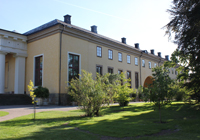
Events 2024-25
| All seminars and other events
are open to the public unless otherwise indicated. The programme is subject to change. |
Upcoming Events, Autumn 2024
17 September, 10:15 a.m. SEMINAR - HYBRID EVENT
Christiaan De Beukelaer, Global Horizons Senior Fellow, SCAS.
Senior Lecturer in Culture and Climate, University of Melbourne
Can Oceanic Climate Regimes Inform a Terrestrial Governance Architecture Fit for
the Anthropocene?
Zoom Webinar: TBC
ABSTRACT: -
24 September, 10:15 a.m. SEMINAR - HYBRID EVENT
Linn Holmberg, Pro Futura Scientia Fellow, SCAS.
Associate Professor of History of Ideas, Stockholm University
The Dictionary Craze in Enlightenment Europe, 1665–1789
Zoom Webinar: TBC
ABSTRACT: -
26 September.
Pro Futura Scientia Day
By invitation only.
1 October, 10:15 a.m. SEMINAR - HYBRID EVENT
Ümit Kurt, Fellow, SCAS.
Assistant Professor, School of Humanities, Creative Industries and Social
Sciences, College of
Human and Social Futures, University of Newcastle
Biographies of Violence: Personhood, Agency and Mass Killing in the Late Ottoman Empire
Zoom Webinar: TBC
ABSTRACT:
8 October, 10:15 a.m. SEMINAR - HYBRID EVENT
Yoko Yamazaki, Human Past Senior Fellow, SCAS.
Researcher, Department of Slavic and Baltic Studies, Finnish, Dutch
and German,
Stockholm University
Working and Eating Together – Uralic=Indo-European Contacts in the Bronze Age
Working
Communities
Zoom Webinar: TBC
ABSTRACT:
15 October, 10:15 a.m. SEMINAR - HYBRID EVENT
Daniel Lee, Fellow, SCAS.
Reader in Modern History, School of History, Queen Mary University of London
Writing the Story of One Roundup of Jews in the Holocaust: Marseille, January 1943
Zoom Webinar: TBC
ABSTRACT: -
17 October. BOOK RELEASE
LAMP Book Release
More information will follow.
22 October, 10:15 a.m. SEMINAR - HYBRID EVENT
Karolina Watroba, Fellow, SCAS.
Post-Doctoral Research Fellow in Modern Languages, All Souls College,
University of Oxford
World Literature in Weimar Germany
Zoom Webinar: TBC
ABSTRACT:
5 November, 10:15 a.m. SEMINAR - HYBRID EVENT
Mathias Thaler, Fellow, SCAS.
Chair of Political Theory, School of Social and Political Science,
University of Edinburgh
Repetition in Action: The Problem of Human Agency in the Anthropocene
Zoom Webinar: TBC
ABSTRACT:
12 November, 10:15 a.m. SEMINAR - HYBRID EVENT
Seyram Avle, Global Horizons Senior Fellow, SCAS.
Associate Professor, Department of Communication,
University of Massachusetts, Amherst
Future Worlds: Chinese Techno Power and African Imaginaries
Zoom Webinar: TBC
ABSTRACT:
19 November, 10:15 a.m. SEMINAR - HYBRID EVENT
Vito Laterza, SCAS-Nordic Fellow, SCAS.
Associate Professor of Development Studies, Department of Global
Development and
Planning,
University of Agder
Becoming Double: Digital Humanity, Surveillance Capitalism and the Cambridge
Analytica
Data Scandal
Zoom Webinar: TBC
ABSTRACT:
26 November, 10:15 a.m. SEMINAR - HYBRID EVENT
Kateryna Bondar, SCAS-VUIAS Fellow, SCAS.
Associate Professor, Practical Psychology Department, Kryvyi Rih State
Pedagogical
University
Digital Citizenship Dynamics: Exploring Ukrainian Youth Perspectives Amidst the
Russian
Military Invasion
Zoom Webinar: TBC
ABSTRACT:
3 December, 10:15 a.m. SEMINAR - HYBRID EVENT
Elizabeth Hull, Fellow, SCAS.
Senior Lecturer in Anthropology and Chair of the Food Studies Centre,
SOAS University
of London
Beyond Crisis: Navigating Volatility in South Africa’s Informal Food Sector
Zoom Webinar: TBC
ABSTRACT:






